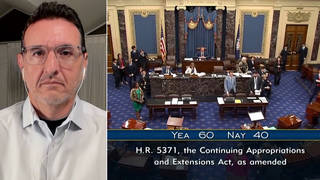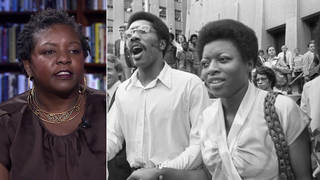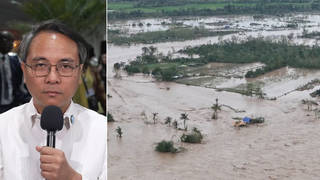HeadlinesJanuary 29, 2014
Obama Seeks Guantánamo Closure, Support for Iran Deal in SOTU Address
President Obama delivered the fifth State of the Union of his time in office with a vow to take action on his own should Congress stonewall progress on key issues. Obama pledged to reform NSA surveillance programs and veto new sanctions on Iran while the interim nuclear deal is in effect. He also renewed his call for the closure of the U.S. military prison at Guantánamo Bay.
President Obama: “With the Afghan War ending, this needs to be the year Congress lifts the remaining restrictions on detainee transfers and we close the prison at Guantánamo Bay, because we counter terrorism not just through intelligence and military action, but by remaining true to our constitutional ideals and setting an example for the rest of the world. … The sanctions that we put in place helped make this opportunity possible. But let me be clear: If this Congress sends me a new sanctions bill now that threatens to derail these talks, I will veto it. For the sake of our national security, we must give diplomacy a chance to succeed.”
GOP Suggests Challenge to Minimum Wage Hike for Federal Workers
On the domestic front, President Obama announced an executive order lifting the minimum wage for federal contractors to at least $10.10 an hour. He also called on Congress to lift the minimum wage for all workers to that same amount, and urged CEOs to act voluntarily with the same increase for their employees. Republicans have already hinted at legal action to stop some of Obama’s stated plans to take action on his own. House Speaker John Boehner said he does not think the lifting of the minimum wage will help workers.
House Speaker John Boehner: “Well, I suspect the president has the authority to raise the minimum wage for those dealing with federal contracts. Let’s understand something: This affects not one current contract. It only affects future contracts with the federal government. And so, I think the question is: How many people, Mr. President, will this executive action actually help? I suspect the answer is somewhere close to zero.”
Syria Talks Resume after Assad Regime Cites “Terrorist” Backing
The Syrian peace talks have resumed in Switzerland today after a breakdown in negotiations. The United Nations suspended the sessions on Tuesday after the Syrian government demanded the conference criticize the United States for arming what it called “terrorist” groups in the Syrian opposition. Envoy Lakhdar Brahimi said that despite high tensions, the talks will continue.
Lakhdar Brahimi: “These are not easy negotiations. And they haven’t been easy today, they haven’t been easy these past days, and they will probably not be easy in the coming few days. But I’m glad that you have been told by representatives of the two sides that they intend to stay and to continue these discussions until Friday, as originally planned. So nobody is walking out. Nobody is running away.”
Homs Remains Without Aid Despite Gov’t Pledge
The Syrian government claimed earlier this week it is prepared to grant humanitarian access to besieged civilians in the city of Homs. But a U.N. spokesperson said the World Food Programme has yet to receive the needed permission to send in supplies.
Elisabeth Byrs: “The U.N. hub in Homs is preparing for an inter-agency convoy to deliver urgently needed humanitarian assistance to besieged families who have been trapped in the old city of Homs and not receiving humanitarian assistance for almost two years. WFP has trucks on standby to deliver food for trapped families and is also prepared to provide ready-to-eat food rations to women and children who choose to be evacuated from the old city of Homs, if access is granted.”
Egypt Orders Trial for 20 Detained Al Jazeera Journalists
Egypt’s top prosecutor has moved to force 20 journalists with the news network Al Jazeera to stand trial. The group of 16 Egyptians and four foreigners face charges of aiding a terrorist group and “spreading false news.” It is the first case of terror-related charges against journalists and foreigners since the government declared the Muslim Brotherhood a terrorist organization last month.
U.N. Security Council Approves European Troop Deployment to Central African Republic
The U.N. Security Council has approved a new deployment of European soldiers to the Central African Republic. The move comes amid continued warnings the country’s sectarian conflict between Christian and Muslims could turn into a genocide. French U.N. Ambassador Gérard Araud said European forces will take control of a camp for displaced residents in the capital of Bangui.
Gérard Araud: “We are starting, I think, to stabilize the situation, but it’s still very fragile. So we really do need the arrival of the European forces, because our contingent for the moment has been largely committed to the protection of the 100,000 IDPs who have taken refuge on the airport — 100,000, which is really a city. So the European Union will protect these people, and it will allow the French forces to deploy more strongly to the city of Bangui.”
Latin American, Caribbean Leaders Meet in Cuba
Latin American and Caribbean leaders are in Cuba for the second annual summit of a regional grouping that excludes the United States and Canada. The Community of Latin American and Caribbean States held its first gathering last year as a counterweight to forums that exclude Cuba, such as the Summit of the Americas. The Organization of American States re-admitted Cuba in 2009, but Cuba has refused to join so long as the U.S. embargo continues. On Monday, Cuban President Raúl Castro said Latin American and Caribbean countries are forging greater ties after years of U.S. domination.
Cuban President Raúl Castro: “Independently from our progress, we continue to live in a world regulated by an unfair and selective world order, in which threats to peace and external meddling in the region continue. We can’t forget the long history of intervention in internal affairs, military invasions and bloody coup d’états. The so-called 'centers of power' do not resign to the fact that they have lost control in this rich region, nor will they resign their attempts to change the course of history in our countries in order to recover their lost influence and benefit from its resources.”
Tunisia Approves Landmark Constitution
Tunisia has approved its first constitution since the 2011 uprising that ousted President Zine El Abidine Ben Ali. The charter passed the National Assembly by an overwhelming majority following a months-long deadlock. Seen as one of the most progressive constitutions in the region, it designates Islam as the national religion, but guarantees freedom of worship and recognizes gender equality.
Study: 85 Richest People Hold Wealth Equal to 3.5 Billion Poorest
A new study says the world’s 85 richest people have as much as wealth as the 3.5 billion poorest people — half of the global population. According to Oxfam, the wealth of the world’s richest 1 percent amounts to $110 trillion — 65 times the total for the global bottom half. Seven out of 10 people worldwide live in countries where inequality has grown over the last three decades.
GOP Rep. Resigns Following Cocaine Arrest
Republican Congressmember Trey Radel of Florida has resigned two months after pleading guilty to misdemeanor possession of cocaine. Radel was arrested in October followed by a stint in rehab. He had voiced his intention to remain in office but came under pressure from fellow Republicans to step down. Radel’s arrest came just weeks after he voted for a provision that would force food stamp recipients to undergo drug testing.
Postal Workers Rally Against Gov’t Contract with Staples
Dozens of U.S. Postal Service workers rallied in San Francisco on Tuesday in protest of government plans to expand postal services to the office retail giant Staples, despite its use of non-union workers. Postal workers say they intend to hold a number of ongoing rallies against the move.
College Football Team Seeks Unionization; Player Comes Out as Gay
In sporting news, two historic firsts have come out of the world of college football. Players at Northwestern University have filed papers to become recognized as a union. The players are not seeking a salary from the billions in revenue generated by the NCAA, but want medical protections for concussions and other injuries, as well as guarantees on their academic scholarships. Meanwhile, a member of Oregon’s Willamette University football team has become the first active player to come out as openly gay. Conner Mertens, who is bisexual, says he went public in order to help closeted gays avoid feeling stigmatized. Mertens said: “I made the decision that if I could help anyone else avoid feeling the way I felt, I would.”
Supreme Court Halts Missouri Execution over Disclosure of Lethal Drug
The U.S. Supreme Court has halted the execution of a Missouri prisoner after state officials refused to disclose the source of the drug that was to be used to take his life. Herbert Smulls was due to be executed at midnight Wednesday for a 1991 murder. But his attorneys won a stay after arguing Missouri should be forced to name the compound pharmacy used to produce the lethal drug, which is not subject to federal oversight.
11 Arrested Protesting Agri-giant Monsanto
At least 11 people were arrested Tuesday in a protest outside the annual shareholders meeting of the agribusiness giant Monsanto. Inside the meeting, activist shareholders presented resolutions calling for the labeling of genetically engineered products and the completion of a report accounting for the environmental and social impacts of GMO production. Both measures were voted down. Outside the meeting, activists were placed in handcuffs after carrying out a sit-in.
Protester: “Monsanto is fighting democratic efforts to label genetically modified food. We’re here at the Monsanto shareholders meeting to let Monsanto know they can’t go around the country fighting Americans’ right to know what they’re eating. We have a right to know. We need to label GMO food.”
Monsanto won a key victory earlier this month after the U.S. Supreme Court refused to hear an appeal by organic farmers seeking to prevent the company from suing if crops are inadvertently contaminated with its genetically modified seeds. Monsanto has pursued more than 800 patent cases against farmers for allegedly using its seeds without paying.
Most popular
- 1
- 2
- 3
- 4
Non-commercial news needs your support
Please do your part today.










Media Options